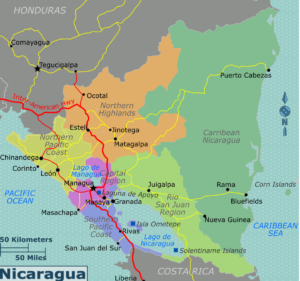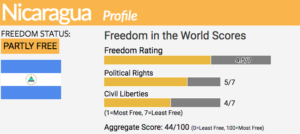Nicaragua’s embattled president Daniel Ortega has attacked pro-democracy protesters engaged in an 11-week student-led uprising as “hate-sowing coup-mongers” and appeared to rule out early elections in a defiant public address, the Guardian reports:
 Ortega, who was democratically elected in 2006 but is accused of ruling in an increasingly authoritarian manner, claimed he was engaged in “a fight for peace” and for the people. However, human rights activists point out that many of the 300-plus people killed since the revolt began on 19 April were gunned down by Ortega’s own security forces or shadowy paramilitary gangs with ties to his government. The victims have included a three-month-old boy whose home was allegedly torched by masked paramilitaries and a teenage altar boy shot through the chest, also allegedly by paramilitaries.
Ortega, who was democratically elected in 2006 but is accused of ruling in an increasingly authoritarian manner, claimed he was engaged in “a fight for peace” and for the people. However, human rights activists point out that many of the 300-plus people killed since the revolt began on 19 April were gunned down by Ortega’s own security forces or shadowy paramilitary gangs with ties to his government. The victims have included a three-month-old boy whose home was allegedly torched by masked paramilitaries and a teenage altar boy shot through the chest, also allegedly by paramilitaries.
 With Ortega refusing to leave office before the end of his current term in 2022, what are the prospects for a peaceful resolution of the current crisis? The Wilson Center asks. What will be the effect of deteriorating economic conditions on the prospects for dialogue? What role, if any, can the United States and other international actors play in the search for a political solution?
With Ortega refusing to leave office before the end of his current term in 2022, what are the prospects for a peaceful resolution of the current crisis? The Wilson Center asks. What will be the effect of deteriorating economic conditions on the prospects for dialogue? What role, if any, can the United States and other international actors play in the search for a political solution?
Speakers:
Carlos Fernando Chamorro, Founder and Editor, Confidencial and director of Esta Semana
Juan Sebastián Chamorro, Executive Director, Nicaraguan Foundation for Economic and Social Development (FUNIDES)
Daisy George West, Member, Civic Alliance for Justice and Democracy (ACJD), Caribbean Coast
Ambassador Carlos Trujillo, U.S. Ambassador to the Organization of American States (invited)
Moderator: Cynthia Arnson, Director, Latin American Program, Wilson Center.
“Nicaraguan Crisis: Next Steps to Advancing Democracy” is the subject of a House Foreign Affairs Committee – Subcommittee on Western Hemisphere – hearing.
Witnesses:
Carlos Trujillo, U.S. Permanent Representative to the Organization of American States
Michael Kozak, senior adviser and senior bureau official at the State Department Bureau of Democracy, Human Rights and Labor
Barbara Feinstein, deputy assistant administrator at the U.S. Agency for International Development’s Bureau for Latin America and the Caribbean.
Thursday, July 12, 2:00 pm
2172 Rayburn Bldg., Capitol Hill, Washington, DC. RSVP







